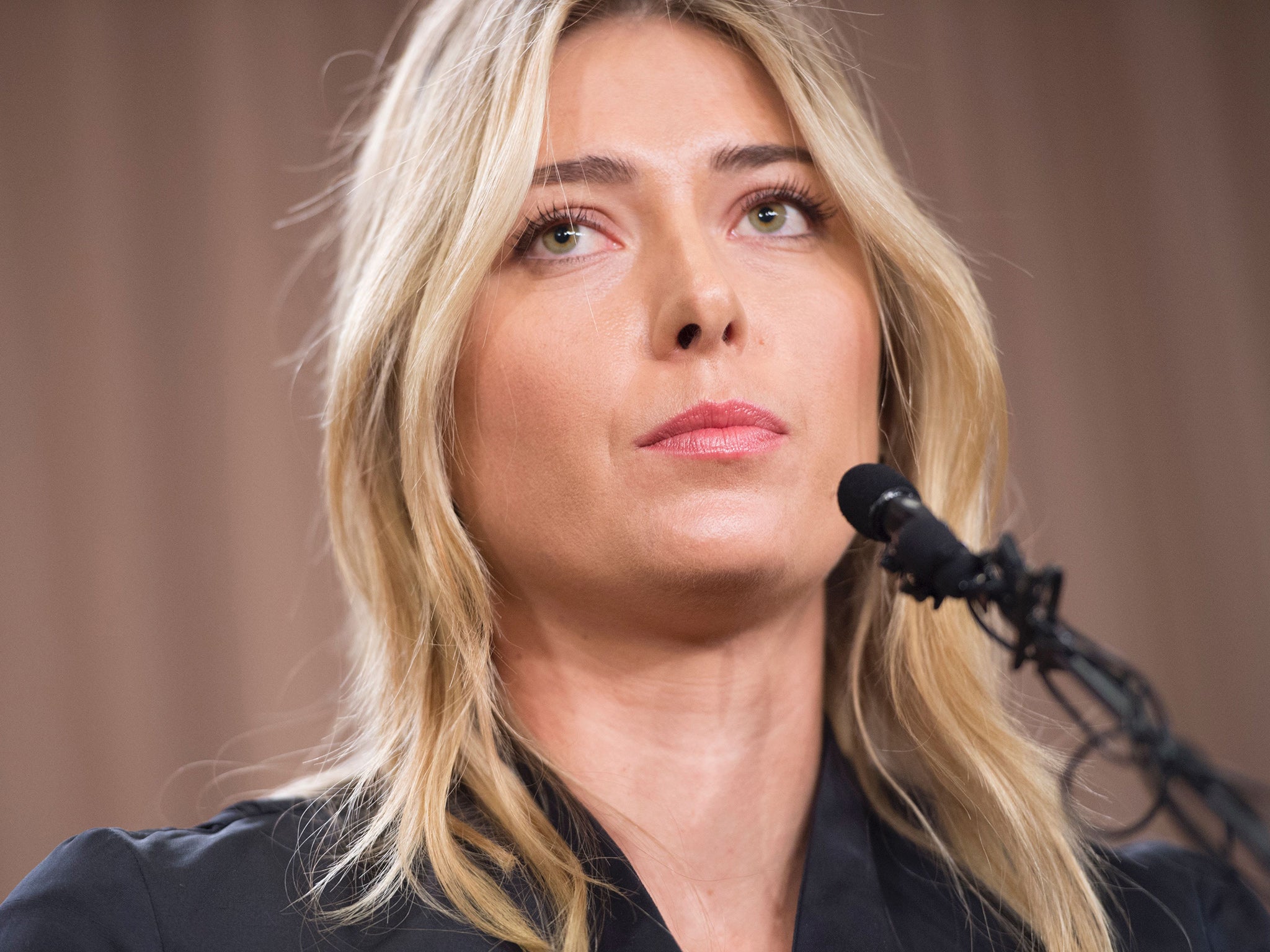Maria Sharapova: Russian ditched by sponsors as questions swirl around her meldonium use
Sharapova claims she was prescribed Meldonium in 2006 after being diagnosed with early signs of diabetes, heart irregularities and a magnesium deficiency

Your support helps us to tell the story
From reproductive rights to climate change to Big Tech, The Independent is on the ground when the story is developing. Whether it's investigating the financials of Elon Musk's pro-Trump PAC or producing our latest documentary, 'The A Word', which shines a light on the American women fighting for reproductive rights, we know how important it is to parse out the facts from the messaging.
At such a critical moment in US history, we need reporters on the ground. Your donation allows us to keep sending journalists to speak to both sides of the story.
The Independent is trusted by Americans across the entire political spectrum. And unlike many other quality news outlets, we choose not to lock Americans out of our reporting and analysis with paywalls. We believe quality journalism should be available to everyone, paid for by those who can afford it.
Your support makes all the difference.The number of questions Maria Sharapova will have to answer following her failed drugs test was growing last night as some of the Russian’s biggest sponsors distanced themselves from a player who 24 hours earlier had been the most marketable woman in world sport.
Nike and Porsche suspended their deals with the former world No 1, who admitted on Monday that she had tested positive for Meldonium, a drug which she said she had taken on medical advice for 10 years. Sharapova accepted full responsibility for failing to read a notice sent to her in December by the World Anti-Doping Agency, which added the drug to its banned list this year because of fears that it was being used for performance-enhancing purposes.
When an International Tennis Federation tribunal eventually hears Sharapova’s case it will want to know whether the former Wimbledon champion regularly disclosed at doping controls that she was taking the drug, as players are required to do. Sharapova said on Monday that she had been prescribed the drug in 2006 after being diagnosed with early signs of diabetes, heart irregularities and a magnesium deficiency.
The tribunal will also be keen to hear how regularly Sharapova had taken the drug, especially as the Latvian manufacturers said yesterday that it was normally prescribed for periods of just four to six weeks, though the treatment can be repeated two or three times a year. The drug, which is used in some countries to treat chest pain and heart problems, is not licenced in the United States, where Sharapova lives.
Sharapova, who faces a lengthy ban, is the latest in a growing line of athletes, particularly from Russia, who have tested positive for Meldonium. They include the Olympic gold medal-winning ice dancer Ekaterina Bobrova, who has been provisionally suspended by her sport’s governing body, the cyclist Eduard Vorganov and two Ukrainian biathletes.
One study last year was said to have found traces of the drug in 17 per cent of more than 4,000 samples taken from Russian athletes last year. Another international study is said to have found it in 2.2 per cent of random urine samples taken from professional athletes.
Nick Wojek, head of science and medicine at UK Anti-Doping, said: “It’s not a drug used in western Europe and America as a therapeutic drug, so you’d think that’s a very high percentage [2.2 per cent]. I think it would infer...that there would be some misuse within that number, hence why it’s gone on to the banned list. If you’re using a drug for a non-therapeutic reason then for me that’s an unethical use.”
It also emerged last night that Meldonium was regularly given to Soviet troops to increase their stamina and deal with oxygen deprivation when they fought in the mountains of Afghanistan in the 1980s.
Nike, which in 2010 agreed an eight-year contract with Sharapova worth more than $70m (£49m) in the biggest sponsorship deal ever given to a woman athlete, said in suspending its ties with her that it was “saddened and surprised”. Of her other sponsors, Porsche expressed “regret” in suspending its deal, Tag Heuer said it would not seek to renew its contract, which expired at the end of last year, and Evian said it would monitor developments.
While Serena Williams said that Sharapova had been “very honest” and shown “a lot of courage”, one of her predecessors as world No 1, Jennifer Capriati, said she was “extremely angry and disappointed”. Capriati said that she had “never opted to cheat no matter what” and had not had the “high-priced team of [doctors] that found a way for me to cheat and get around the system and wait for science to catch up”.
Join our commenting forum
Join thought-provoking conversations, follow other Independent readers and see their replies
Comments